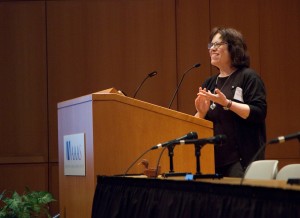
Deborah Blum, a science journalist and director of the Knight Science Journalism Program at the Massachusetts Institute of Technology, kicked off DCSWA’s 2016 Professional Development Day (PDD) with a plenary talk titled “How to start a magazine in just 10 months (what’s smart and what’s not).”
The exemplar magazine under discussion is UnDark, an editorially independent digital publication of the MIT program, and of which Blum is publisher. According to its website, UnDark’s editorial mission is to “explore science in both light and shadow, and to bring that exploration to a broad, international audience.” According to Blum, the magazine explores human discoveries, ethical conundrums and the realities of what we get right and wrong at the intersection of science and society.
Blum gave a brief tour of UnDark’s online platform: first, the homepage, crisply displaying original content. She pointed out one story, “FDA Issues Warning on Arsenic in Infant Rice Cereal,” written by Blum herself. She recalled getting a tip on the news at Logan International Airport in Boston just before her flight to D.C. to participate in PDD.
“We knew they’d announce this by afternoon, so I just go-go-inflighted the whole way to D.C.,” said Blum, laughing. “When I arrived, I bolted right into an airport bar to write this!”
She also pointed out the “What I Left Out” section, where authors share what didn’t survive to final manuscripts. “The Root From Issyk-Kul Revisited” is a story by science writer Elizabeth DeVita-Raeburn, as told to her by her father, Dr. Vincent DeVita, Jr., a chemotherapy pioneer. In it, DeVita-Raeburn gives a quirky recollection of the unique combination of this-vodka and that-root approach to curing cancer, which was left out of their co-authored book The Death of Cancer.
After the site tour, Blum got down to business: “So, how did we do this in 10 months, out of nothing, and get people to pay attention to us?”
Her ground rules were:
- Recruit an amazing advisory board. It makes all the difference.
- Prioritize being freelancer friendly. In the case of UnDark, MIT lawyers helped the team develop contracts that truly worked well for both the publication and freelancers, which is rare.
- Be risky, honest and smart about it. When you have a great idea, and you think it’s worth it, “Decide that you’re willing to get yelled at for certain things, and then deal with it,” Blum said.
To illustrate her third point, Blum highlighted her story “Five Questions for Steven Pinker,” which, for science writing, contains an unusually high number of slurs and pejoratives—but for a higher purpose.
Blum joked that the day she published the story, she thought every incoming phone call was from the president of MIT. But in the end, while the MIT Twitter account didn’t exactly promote the story, they didn’t denounce it, either.
“They simply turned the other way and let it go, and with something this important, that’s good.”
In addition to key ground rules, Blum pointed out a simple but important decision the UnDark team made: to disable the comments sections on main stories, channeling any discussion to the blog pages.
“You don’t want the content to become derailed,” she said, saying she had enough of that experience as a columnist at Wired. “Just try writing one blog post on fluoride and see what results from that.”
To close the plenary, Blum spoke to a challenge that magazine startups and writers have in common: “becoming visible without becoming a jerk.”
Blum told a humorous anecdote to illustrate that challenge: Earlier in Blum’s career, a friend living in Chicago urged her drum up attention by hosting a competition, in which contestants could win a weekend meeting with Blum in Chicago. In the end, her efforts to gain visibility backfired: the winner was an Ohio owner of a cement company who ultimately said he’d just rather take cash.
Blum says the contest wasn’t exactly a “jerk” move, but that science writers are better off focusing on the pursuit of what they love, rather than on visibility. Blum succeeded as a toxicology writer not because no one else was covering it, but because it genuinely thrilled her. In other words, if you don’t love tofu, she said, don’t strive to be the expert tofu writer just to fill that gap.
“I’ll tell you exactly what I tell my own kids,” she said. “A successful life is a life you like.”

Sorry, comments are closed for this post.